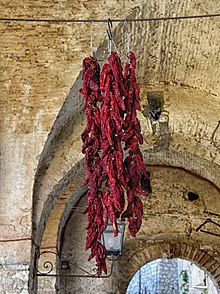The peperone crusco ('crispy pepper' in the local dialects), also known as crusco pepper[2] outside Italy, is a typical product of the Basilicata region of Italy.
| Peperone crusco | |
|---|---|
 | |
| Species | Capsicum annuum |
| Origin | Basilicata, Italy |
| Heat | None |
| Scoville scale | 0[1] SHU |
It is recognised as a prodotto agroalimentare tradizionale (PAT).[3] Being deeply rooted in local cuisine, it is often characterised as "the red gold of Basilicata".[2]
Peperone crusco is also fairly common in Calabria and limited uses can be found in Apulia, Abruzzo and Molise.[4]
Description
editIt is a dried and sweet-flavoured type of Capsicum annuum, cultivated in Basilicata since the 1600s. Usually the Senise pepper variety is used for its preparation, for the thin pulp and low water content which make it easier to be dried.[5] It can assume three shapes: pointed, conical or hooked.
Cultivation
editSowing begins in spring and harvest between July and August. Peppers are placed on cloths for three days in shady and dry places. Afterwards, they are tied with a lace forming garlands, called "serte", and dried outdoors in the summer period. By tradition, they are hung on windows, balconies and houses' walls.[2]
Culinary uses
editThe peperoni cruschi are a staple of Lucanian cuisine. They can be consumed on their own as a vegetable chip, as a side dish, and as a flavour enhancer.[6] Regularly they are cleaned with a dry cloth or kitchen paper, deprived of the petiole and the seeds and flash-fried for one or two seconds in hot olive oil, achieving a crispy texture after cooling down.[7] Among traditional dishes with peperone crusco as a relevant ingredient are pasta con i peperoni cruschi, baccalà alla lucana, acquasale and pane cotto. It is also used as a powder flavour to enrich meat, legumes, bakery products, chocolate and ice cream.
See also
editReferences
edit- ^ "Peperone Di Senise: Basilicata's Sweet Treasure". pepperscale.com. 17 August 2019. Retrieved 17 September 2020.
- ^ a b c "Crusco Peppers: the Red Necklaces of Basilicata Towns". lacucinaitaliana.com. 16 September 2019. Retrieved 17 September 2020.
- ^ "Peperoni cruschi". topfooditaly.net. Retrieved 17 September 2020.
- ^ "Come si friggono e si preparano i peperoni cruschi". saporideisassi.it (in Italian). 19 February 2018. Retrieved 23 September 2020.
- ^ "Senise Pepper". fondazioneslowfood.com. Retrieved 17 September 2020.
- ^ "Peperoni cruschi". tasteatlas.com. Retrieved 16 September 2020.
- ^ "Cavatelli pasta with peperoni cruschi". the-pasta-project.com. 25 September 2017. Retrieved 16 September 2020.
Further reading
edit- Boulter, Liz (9 July 2017). "Moreish crunch, smoky tang: red peppers of Italy's far south". The Guardian. Retrieved 27 October 2020.